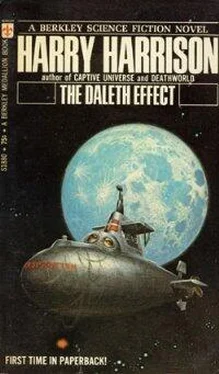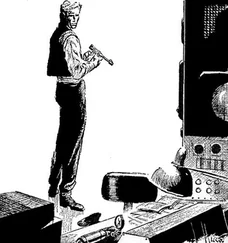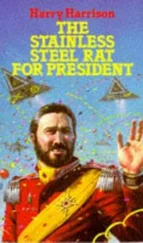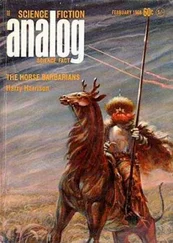“And at what spot do we look in the Sea of Tranquility? Do we follow this?” Nils pointed to the blurry photograph of the Moon that had been cut from the newspaper Pravda.› There was a red star printed in the north of the mare where the cosmonauts had landed. “Pravda says this is where they are. Do we navigate from a newspaper photo?”
“We do unless you can think of something better,” Arnie said mildly. “And do not forget our direction finder is a standard small boat model bought from A.P. Moller Ship Supplies in Copenhagen. Does that bother you too?”
After one last scowl Nils burst out laughing. “The whole thing is so outrageous that it just has to succeed.” He fastened his lap belt. “Blaeksprutten to the rescue!”
“It is all much more secure than it might look,” Ove explained. “You must remember that we had this operational submarine to begin with. It is a sealed, tested, proven, self-sufficient spaceship built for a different kind of space. But it works just as well in a vacuum as under water. And the Daleth drive is operational and reliable—and will get us to the Moon in a few hours. The combination of radar and computer on Earth will track us and compute the correct course for us to follow. Everything possible has been done to make this trip a safe one. There will be later voyages and the instrumentation will be refined, but we have all we need now to get us safely to the Moon afld back. So don’t worry.”
“Who is worrying?” Nils said. “I always sweat and get pale at this time of day. Is it time to leave yet?”
“A few more minutes to go,” Arnie said, looking at the electronic chronometer before him. “I am going to take off and get a bit of altitude.”
His fingers moved across the controls and the deck pressed up against them. The waves dropped away. Tiny figures were visible aboard the Vitus Bering, waving enthusiastically, then they shrank and vanished from sight as Blaeksprutten hurled itself, faster and faster, into the sky.
The strangest thing about the voyage was its utter uneventfulness. Once clear of the atmosphere they accelerated at a constant one G. And one gravity of acceleration cannot be sensed as being different in any way from the gravity experienced on the surface of the Earth. Behind them, like a toy, or the projection on a large-size screen, the globe of the Earth shrank away. There was no thunder of rockets or roar of engines, no bouncing or air pockets. Since the ship was completely sealed, there was not even the small drop in atmospheric pressure that is felt in a commercial airliner. The equipment worked perfectly and, once clear of the Earth’s atmospheric envelope, their speed increased.
“On course—or at least we are aimed at the target star,” Nils said. “I think we can check with Copenhagen now and see if they are tracking us. It would be nice to know if we are going in the right direction.” He switched the transceiver to the preset frequency and called in the agreed code.
“Kylling calling Halvabe. Can you read me? Over.” He threw the switch. “I wonder what drunk thought up these code names,” he mumbled to himself. The sub was the “chick” and the other station the “lemur”—but these names were also slang terms for a quarter-litre and a hali-litre bottle of akvavit.
“We read you loud and clear, Kylling. You are on course, though your acceleration is slightly more than optimum. Suggest a five percent reduction.”
“Roger. Will conform. Are you tracking us?”
“Positive.”
“Will you send turnover signal?”
“Positive.”
“Over and out.” He killed the power. “Did you hear that? Things couldn’t be better.”
“I have cut the acceleration by the five percent,” Arnie said. “Yes, things could not be better.”
“Would anyone like a Carlsberg?” Ove asked. “Someone has stuffed a whole case back here.” He passed a can to Nils, but Arnie declined.
“Finish them quickly,” he said. “We are not far from turnover, and I cannot guarantee that things will not get shaken up a bit. I could reduce the thrust to zero before I turned the ship, but that would put us in free fall for awhile and I would like to avoid that if I could. Aside from our personal feelings, the equipment just isn’t designed for it. Instead, I shall attempt to rotate the ship one hundred eighty degrees while maintaining full thrust, at which point we will begin to decelerate.”
“Sounds fine to me,” Nils said, squinting through the periscope and making a precise adjustment. “But what about our course? Is that what we use this gas pipe in the deck for? The one that Henning was moaning about because it needed a hole in his pressure hull?”
“That is correct. There is a wide-angle lens system here, with an optical gunsight fitted into it.”
“The kind used on fighter planes to fire the guns?”
“Precisely. You will keep the star centered as before. I envisage no problems.”
“No, no problems at all.” Nils looked around at the jury-rigged and hurriedly converted sub and shook his head in wonder. “Will one of you take the con for me for a minute? I have to go to the head… The beer, you know.”
Turnover went smoothly, and they would not have known they were rotating if they hadn’t watched the sunlight move across the deck and up the bulkhead. A few loose objects rattled, and a pencil rolled across the desk and fell.
Time moved swiftly. The sun glared and there was some discussion of solar storms and Van Allen radiation. These were no serious menace since the pressure hull of the submarine was a solid metal barrier, incredibly thicker than that of any rocket ever launched.
“Have you thought about talking to the cosmonauts?” Ove asked. He stood in the doorway of the engine compartment where he could watch the fusion generator and talk with the others at the same time.
“They are all pilots,” Nils said. “So they should speak English.” Ove disagreed.
“Only if they have flown out of the country. Inside the Soviet Union Aeroflot uses Russian. Only on international flights is English required for radio control. I put in six months there, at Moscow University, so I can talk to them if I have to. I was hoping that one of you was more fluent.”
“Hebrew, English, Yiddish, or German,” Amie said. “That’s all.”
“Just English, Swedish, and French,” Nils told them. “It looks like it is up to you, Ove.”
Like most Europeans with college education they took it for granted that one spoke at least one language other than his own. Like Scandinavians, two or three other languages were more likely. They assumed that the cosmonauts would speak something they could understand.
The computer kept track of their progress and, when the four hours were neaiing their end, they were informed that they could turn on their radio altimeter because they were nearing the point where it would be effective. Its maximum range was a hundred and fifty kilometers.
“Getting a fringe reading,” Nils called, excited. “The Moon is down there all right.” Since midpoint they had not seen the satellite which was beneath their keel.
“Let me know when we are about a hundred kilometers above the surface,” Arnie said. “I’ll roll the ship then so we can see through the side ports.”
There was a growing tension now as the spacegoing submarine hurtled down toward the Moon, still out of sight below them.
“The altimeter is unwinding pretty fast,” Nils said, his controlled pilot’s voice showing none of the tension he felt.
“I’ll raise the deceleration up to two G’s,” Arnie said. “Stand by.”
It was a strange sensation, as though they were suddenly growing heavier, with their arms pulled down and their chins sinking to their chests: their chairs creaked and their breathing labored. Nils moved his hand to the controls, and it felt as though weights hung from his arm. He weighed over four hundred pounds now. “Rate of drop slowing,” he said. “Coming up on a hundred kilometers. Rate of drop slowing to near zero.”
Читать дальше











